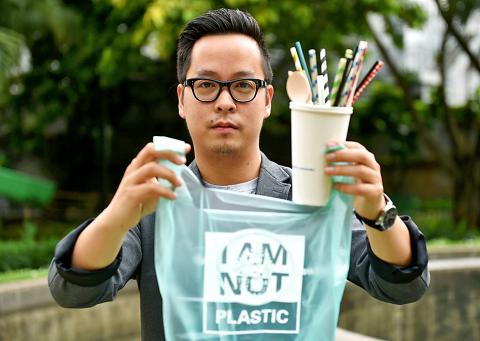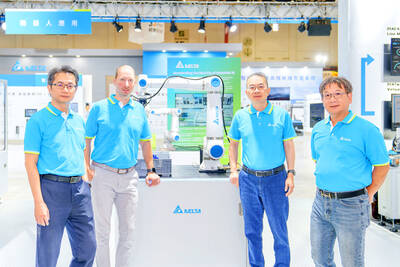From bags washing up on Bali’s beaches to food packaging scattered across roads and clogging waterways in cities, Indonesia is facing a plastic waste crisis driven by years of rapid economic growth.
Now an entrepreneur from Bali, disgusted at the rubbish littering the famous holiday island, is trying to tackle the problem with alternatives to conventional plastic.
His company, Avani Eco, produces goods including cassava carrier bags, takeaway food containers made from sugar cane and straws fashioned from corn starch, which founder Kevin Kumala says biodegrade relatively quickly and do not leave any toxic residue.

Photo: AFP
“I’m an avid diver and surfer, and I’m out there seeing this plastic pollution in front of my very eyes,” Kumala says, explaining why he decided to get into the business of biodegradable plastics, known as “bioplastics.”
After witnessing the pollution around Bali, he says tackling the problem is “something that needs to be done.”
In Indonesia, the waves of plastic flooding into rivers and oceans have been causing problems for years — waterways in cities become clogged, increasing the risk of floods, as well death and injury to marine animals who become tramped or ingest plastic packaging.
The archipelago of more than 17,000 islands is one of the worst offenders when it comes to marine littering, with US charity Oceans Conservancy estimating the country dumps the second-highest amount of plastic into the sea, behind only China.
Kumala set up Avani Eco several years ago with its headquarters on Bali and a main factory on Java island, and the biodegradable goods went on sale in 2015.
The most popular product is the bags made from cassava — an edible tropical root that is cheap and abundant in Indonesia — with the words “I am not plastic” emblazoned on them.
The entrepreneur, who is a biology graduate, is happy to demonstrate the bags are not harmful — he put some material from a cassava bag into a glass of hot water, watched it quickly dissolve and then gulped down the resulting concoction.
“It gives hope to sea animals, they are no longer choking or ingesting something that could be hazardous,” he said.
About 3 tonnes of the bags are produced a day at the Java factory and sold to businesses, including shops and hotel groups, mostly in Bali and across Indonesia, but also to a growing number of companies abroad.
However, being environmentally friendly does cost, with a cassava bag typically about US$0.03 more expensive than a plastic bag.
The material for the other products Avani Eco sells are sourced in Indonesia, but some items are made in China as it is more cost effective to do so — though this does add to their carbon footprint.
Kumala says the final products can biodegrade in just a matter of months — and the bags disappear almost instantly in hot water — unlike the years required for conventional plastic to break down.
However, other bioplastics have long been on the market, and the UN Environment Program (UNEP) has expressed skepticism about the industry.
The UN body concluded in a 2015 report that they tended to be more expensive and were unlikely to play a major role in reducing marine litter.
Bioplastics are defined as plastics made from materials such as corn starch and vegetable fats and oil, while common plastics are made from natural gas or petroleum.
UNEP senior official Habib el-Habr, who works on protecting the marine environment, said bioplastics were “innovative solutions” that could be part of a long-term solution, but added: “We don’t know enough about this technology.”
Still Indonesia needs all the help it can get to deal with its waste.
Tuti Hendrawati Mintarsih, a senior official from the Indonesian Ministry of Environment and Forestry, who deals with waste, conceded there was no government funding specifically aimed at reducing plastic waste.
However, she said authorities were planning to implement a nationwide scheme compelling shops to charge for plastic bags this year, a scheme that has been trialled in other cities and has successfully reduced usage.
Despite the challenges, Kumala is upbeat that Indonesia’s plastic scourge can be tackled and has plans to expand to other countries in the region.

SETBACK: Apple’s India iPhone push has been disrupted after Foxconn recalled hundreds of Chinese engineers, amid Beijing’s attempts to curb tech transfers Apple Inc assembly partner Hon Hai Precision Industry Co (鴻海精密), also known internationally as Foxconn Technology Group (富士康科技集團), has recalled about 300 Chinese engineers from a factory in India, the latest setback for the iPhone maker’s push to rapidly expand in the country. The extraction of Chinese workers from the factory of Yuzhan Technology (India) Private Ltd, a Hon Hai component unit, in southern Tamil Nadu state, is the second such move in a few months. The company has started flying in Taiwanese engineers to replace staff leaving, people familiar with the matter said, asking not to be named, as the

The prices of gasoline and diesel at domestic fuel stations are to rise NT$0.1 and NT$0.4 per liter this week respectively, after international crude oil prices rose last week, CPC Corp, Taiwan (台灣中油) and Formosa Petrochemical Corp (台塑石化) announced yesterday. Effective today, gasoline prices at CPC and Formosa stations are to rise to NT$27.3, NT$28.8 and NT$30.8 per liter for 92, 95 and 98-octane unleaded gasoline respectively, the companies said in separate statements. The price of premium diesel is to rise to NT$26.2 per liter at CPC stations and NT$26 at Formosa pumps, they said. The announcements came after international crude oil prices

STABLE DEMAND: Delta supplies US clients in the aerospace, defense and machinery segments, and expects second-half sales to be similar to the first half Delta Electronics Inc (台達電) expects its US automation business to remain steady in the second half, with no signs of weakening client demand. With demand from US clients remaining solid, its performance in the second half is expected to be similar to that of the first half, Andy Liu (劉佳容), general manager of the company’s industrial automation business group, said on the sidelines of the Taiwan Automation Intelligence and Robot Show in Taipei on Wednesday. The company earlier reported that revenue from its automation business grew 7 percent year-on-year to NT$27.22 billion (US$889.98 million) in the first half, accounting for 11 percent

A German company is putting used electric vehicle batteries to new use by stacking them into fridge-size units that homes and businesses can use to store their excess solar and wind energy. This week, the company Voltfang — which means “catching volts” — opened its first industrial site in Aachen, Germany, near the Belgian and Dutch borders. With about 100 staff, Voltfang says it is the biggest facility of its kind in Europe in the budding sector of refurbishing lithium-ion batteries. Its CEO David Oudsandji hopes it would help Europe’s biggest economy ween itself off fossil fuels and increasingly rely on climate-friendly renewables. While